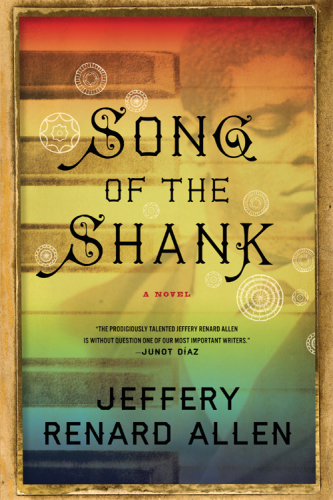
Song of the Shank
A Novel
فرمت کتاب
ebook
تاریخ انتشار
2014
نویسنده
Jeffery Renard Allenناشر
Graywolf Pressشابک
9781555970925
- اطلاعات
- نقد و بررسی
- دیدگاه کاربران
نقد و بررسی

April 7, 2014
Allen (Rails Under My Back) spent nearly a decade researching and crafting this ambitious but unwieldy novel, based on the true story of “Blind Tom,” né Tom Wiggins, who was born a slave in mid-19th-century Georgia. In this retelling, Allen looks to illuminate Tom’s troubled legacy. A blind musical prodigy and so-called autistic savant, Tom played the piano for audiences around the world and was, as a child, the first black American to perform at the White House. “He infuses our best melodies and harmonies with a barbaric element,” Tom’s master claims. Both the conception and the underlying history behind this story will leave readers with a profound understanding of the inhumanity of slavery and 19th century racial attitudes. This is a dense and admirable book that invites an important excavation of the past, yet ultimately provides neither intimacy nor perspective. Agent: Cynthia Cannell, Cynthia Cannell Literary Agency.

Starred review from June 1, 2014
One of America's most gifted novelists projects dark and daring speculations upon the incredible-but-true 19th-century story of a child piano prodigy who was blind, autistic and a slave.In the waning years of antebellum slavery, a rapidly fracturing America was introduced to a stunning musical phenomenon: Thomas Wiggins, a young black slave from Georgia known only as "Blind Tom," who "sounded out" his first piano composition at age 5 and, five years later, was famous enough to play before President James Buchanan at the White House. What made Tom even more remarkable was that he was both blind and autistic, thus compounding audiences' astonishment at his extraordinary ability to not only perform classical works, but to spontaneously weave startling variations on American folk ditties into original musical tapestries. Because most of the details of Wiggins' story have been lost to history, there are many blank, enigmatic spaces to fill. Chicago-born Allen (Holding Pattern, 2008, etc.) assumes the imaginative writer's task of improvising shape and depth where elusive or missing facts should be. What results from his effort is an absorbing, haunting narrative that begins a year after the Civil War ends when Tom, a teenager, and his white guardian, Eliza Bethune, arrive in a nameless northern city (presumably New York), where they are contacted by a black man who intends to reunite Tom with his newly liberated mother. The story rebounds back to Tom's childhood, during which he struggles to feel his surroundings despite his compromised senses and finds his only warmth (literally) beneath the piano belonging to Eliza's slaveholding family. Allen's psychological insight and evocative language vividly bring to life all the black and white people in Tom's life who, in seeking to understand or exploit Tom's unholy gifts, are both transformed and transfixed by his inscrutable, resolutely self-contained personality.If there's any justice, Allen's visionary work, as startlingly inventive as one of his subject's performances, should propel him to the front rank of American novelists.
COPYRIGHT(2014) Kirkus Reviews, ALL RIGHTS RESERVED.

May 15, 2014
This long and obscure novel by the PEN Discovery Prize winner of Rails Under My Back is loosely based on the life of Blind Tom Wiggins (1849-1908), a former slave and piano prodigy who achieved some acclaim in the late 1800s. Tom and his music are not the main focus of the novel, however, which instead features hazy, dreamlike scenes initially involving a woman named Eliza, who seems to have known Tom since she worked in an asylum where he was a resident and is now his chief caretaker. As the novel progresses, Tom and Eliza relocate from somewhere in "the country" back to "the city" and then maybe to a place called Edgemere Island; at some point, Tom's real mother sends an emissary to return him to her. Other sections hint at a manager who has made deals to take the pianist on tour, having signed a contract with the landed Southerner who owns Tom. We also encounter a music teacher, some preachers in the vicinity of Edgemere, and a violent confrontation. The Civil War and its aftermath figure prominently in the dark and indeterminate background of the characters' interactions and relocations. VERDICT There is no reason to doubt this highly regarded author's seriousness of purpose, but this remains a challenging work: long, dense, uncompromising, and mysterious. For sophisticated readers.--James Coan, SUNY at Oneonta Lib.
Copyright 2014 Library Journal, LLC Used with permission.

Starred review from April 15, 2014
Now a fairly obscure historical figure, Tom Wiggins, born a slave, became an international sensation as a pianist. In the extraordinarily talented hands of Allen, Tom is a mysterious and compelling figure, a blind black boy at a time when his perceived infirmities, including his race, should make him insignificant. Apparently an autistic savant, Tom exhibits both giftedness and odd behavior, which unnerves and enthralls those around him. Allen uses Tom as the central figure as the novel explorescomplex relationships and the interior lives of black and white folks, including a mother with little authority over her child, a fairly benign but self-absorbed slave owner, ambitious promoters, an assortment of orphans and former slaves at wit's end about their future, and a genius oblivious to the tumult around him. Told from various perspectives, shifting between the pre and postCivil War periods, Allen's tour de force sweeps from the rural South to New York City and between lonely apartments and raucous refugee camps, encompassing the strife of war and the draft riots. Amid the larger drama of slavery and its injustices, Allen offers the more intimate drama of one young boy's life and the financial and emotional investments involved in the question of what's to be done with his exceptional talent. A brilliant book, with echoes of Ralph Ellison and William Faulkner.(Reprinted with permission of Booklist, copyright 2014, American Library Association.)




دیدگاه کاربران